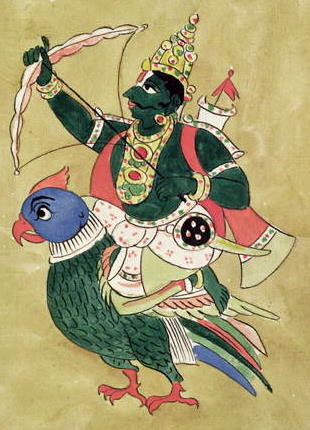Vasant Panchami (वसन्त पंचमी) is a festival to celebrate the arrival of
spring (वसंत). It is celebrated on the fifth day (पंचमी) of the waxing
moon in the month of January/February (माघ शुक्ल पक्ष).
The deity who is worshiped on Vasant Panchami is Sarasvati (सरस्वती), the deity of knowledge and arts. She originated out of Lord Krshn's mouth, carrying a veena (an Indian subcontinent chordophone) and a book (Brahmvaivart Puraan, Brahm Khand or part 1, chapter 3). She is the underlying basis of speech and is the presiding deity of poets. Lord Krshn proclaimed that Devi Sarasvati would be worshiped on Vasant Panchami, a good day to begin education (Brahmvaivart Puraan, Prakriti Khand or part 2, chapter 4). He also prescribed the method of Sarasvati's worship in great detail. Her evocation is recommended using a pot or a book and offerings of white flowers, white clothes and white conch (शंख) are suggested. She is described as bright faced, clad in extremely pure clothes and decorated with ornaments made with the best gems. The following eight syllable mantra is considered the best ode to her and useful to all:
Spring is a helper of Kaam (Shiv Puraan, Rudra Sanhita, Shristi Khand or part 1, chapter 1-2; Shiv Puraan, Rudra Sanhita, Parvati Khand or part 3, chapter 17-19). Other names of Kaam include Manmath, Madan, Darpark and Kandarp. He is married to Rati (Shiv Puraan, Sati Khand or part 2, chapter 3-5). In a later incarnation, he is born as Pradyumn, the son of Lord Krshn (Shiv Puraan, Rudra Sanhita, Parvati Khand or part 3, chapter 18-19).
Kaam Dev carries a flowery bow and five arrows (Brahmvaivart Puraan, Brahma Khand or part 1, chapter 4) namely Maaran (hit), Sthambhan (astriction), Jrmbhan (bloom or stretch), Soshan (absorption) and Unmaadan (frenzy or delirium). His arrow and its deadly effects are described in Atharv Ved (3.25). The arrow has desire as its head, commitment to pleasures as its shaft and contains feathers causing mental agony. The arrow burns the heart and dries out the spleen. It causes loss of peaceful sleep and brings anger as well as sorrow.
The deity who is worshiped on Vasant Panchami is Sarasvati (सरस्वती), the deity of knowledge and arts. She originated out of Lord Krshn's mouth, carrying a veena (an Indian subcontinent chordophone) and a book (Brahmvaivart Puraan, Brahm Khand or part 1, chapter 3). She is the underlying basis of speech and is the presiding deity of poets. Lord Krshn proclaimed that Devi Sarasvati would be worshiped on Vasant Panchami, a good day to begin education (Brahmvaivart Puraan, Prakriti Khand or part 2, chapter 4). He also prescribed the method of Sarasvati's worship in great detail. Her evocation is recommended using a pot or a book and offerings of white flowers, white clothes and white conch (शंख) are suggested. She is described as bright faced, clad in extremely pure clothes and decorated with ornaments made with the best gems. The following eight syllable mantra is considered the best ode to her and useful to all:
Shreem hreem sarasvatye swaahaa
श्रीं ह्रीं सरस्वत्यै स्वाहा
Another deity who is worshiped on Vasant Panchami is Kaam Dev, the deity of desire. Kaam existed before everything else and accompanied the creator's desire to create the universe (Atharv Ved, 19.52.1). He is the seed of psyche.
Kaam Dev carries a flowery bow and five arrows (Brahmvaivart Puraan, Brahma Khand or part 1, chapter 4) namely Maaran (hit), Sthambhan (astriction), Jrmbhan (bloom or stretch), Soshan (absorption) and Unmaadan (frenzy or delirium). His arrow and its deadly effects are described in Atharv Ved (3.25). The arrow has desire as its head, commitment to pleasures as its shaft and contains feathers causing mental agony. The arrow burns the heart and dries out the spleen. It causes loss of peaceful sleep and brings anger as well as sorrow.
 |
Kaam Dev
Source: By Kamadeva.gif: PD-art derivative work: Redtigerxyz (Kamadeva.gif) [Public domain], via Wikimedia Commons |
Comments
Post a Comment